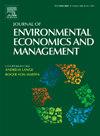Household landfill diversion and the impact on methane emissions
IF 5.9
3区 经济学
Q1 BUSINESS
Journal of Environmental Economics and Management
Pub Date : 2025-05-07
DOI:10.1016/j.jeem.2025.103174
引用次数: 0
Abstract
Food waste accounts for approximately 8% of total global greenhouse emissions. Expanding organics diversion (composting) programs is a common solution for reducing methane emissions from landfills, which are primarily caused by organics. This study explores the staggered implementation of a curbside organics program expansion and finds that households increase their diversion behavior by 45%; however, the program costs per household are nine times greater than the social benefit of avoided methane. The cost/ton of carbon dioxide equivalent emissions (CO2e) avoided is then estimated across the United States for these programs. The median organics program expansion would cost $478/ton of CO2e avoided. However, this estimate has substantial heterogeneity because some municipalities, particularly large cities, are served by landfills with methane capture, resulting in the largest potential methane producers having among the lowest methane emissions per household. The findings suggest that current organics program designs may be difficult to justify solely on climate grounds.
家庭垃圾填埋改道及其对甲烷排放的影响
食物浪费约占全球温室气体排放总量的8%。扩大有机转移(堆肥)计划是减少垃圾填埋场甲烷排放的常见解决方案,甲烷排放主要由有机物引起。本研究探讨了路边有机项目扩展的交错实施,发现家庭的转移行为增加了45%;然而,每户家庭的项目成本是避免使用甲烷的社会效益的九倍。然后估算这些项目在美国避免的每吨二氧化碳当量排放(CO2e)的成本。有机项目扩张的平均成本为每吨二氧化碳当量减少478美元。然而,这一估计存在很大的不均匀性,因为一些城市,特别是大城市,是由具有甲烷捕获的垃圾填埋场提供服务的,因此,最大的潜在甲烷生产者的每户甲烷排放量最低。研究结果表明,目前的有机项目设计可能很难仅仅从气候的角度来证明。
本文章由计算机程序翻译,如有差异,请以英文原文为准。
求助全文
约1分钟内获得全文
求助全文
来源期刊
CiteScore
8.00
自引率
4.30%
发文量
91
期刊介绍:
The Journal of Environmental Economics and Management publishes theoretical and empirical papers devoted to specific natural resources and environmental issues. For consideration, papers should (1) contain a substantial element embodying the linkage between economic systems and environmental and natural resources systems or (2) be of substantial importance in understanding the management and/or social control of the economy in its relations with the natural environment. Although the general orientation of the journal is toward economics, interdisciplinary papers by researchers in other fields of interest to resource and environmental economists will be welcomed.

 求助内容:
求助内容: 应助结果提醒方式:
应助结果提醒方式:


